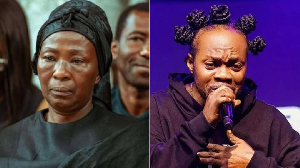First, let me emphasize that if the statements made by Mr. K. T. Hammond, for which he has been sued, were made by any ordinary person, Mr. Tsatsu Tsikata could still not prevail in his defamation claim. The statements will be protected by the 'fair comment' doctrine. Both case law and the Constitution protect such comments on matters of public interest. In other words, parliamentary immunity is not a necessary defense, although it is sufficient.
Second, because Tsatsu Tsikata is a public official, he has a burden to show that whoever is making the statements did so with actual malice. This means he has the burden of showing that the person making the statements either knew them to be false or was reckless as to whether they were or not. This is a burden that Mr. Tsikata cannot carry.
The very nature of public discourse, the necessity of holding public officers/officials accountable and the opaque information environment necessitate an accommodation of false statements. As such, mere falsity is not a sufficient criterion for defamation. Actual malice must also be present. To hold otherwise will not only stultify speech, it will undermine the very foundation of democratic accountability.
On closer and careful examination, the disputed statements are not false at all but are inferences drawn on the basis of scattered facts. Thus, the implicated statements hardly meet the falsity bar let alone the more stringent malice standard. That, too, alone will drown this suit.
Third, one cannot defame merely by stating an opinion or drawing an inference based on facts. Here, the facts are that GNPC asserts it has approved ex gratia or ESB to Tsatsu who left the outfit some 15 years ago.
On those facts, one can state the opinion that the payment is criminal and hence Tsatsu must be prosecuted. A defamation claim does not exist where the alleged tortfeasor is merely stating subjective beliefs based on disclosed true facts.
Similarly, Mr. Hammond analogizes the receipt of the ex gratia to the receipt of stolen goods. To say that Tsatsu has received stolen goods cannot reasonably be interpreted as stating actual facts. It is a figurative or hyperbolic language that is not actionable as defamation.
Citizens and agencies of the mass media are constitutionally empowered to uphold the responsibility and accountability of the Government to the people of Ghana. This is a responsibility that cannot be discharged if we have to constantly weigh the threats of being entangled in defamation suits each time we talk about government chicanery. This is particularly so in a polity that has frozen the freedom of information bill, making it impossible to ascertain facts with ease! In effect, representative and responsible government cloth citizens with a privilege that shields them from defamation when they comment on public issues aimed at holding government responsible and accountable.
Here, it must be noted that Hammond's speech was extremely useful in forcing the GNPC to issue a statement that contained several inconsistencies, further buoying the theory that the approved payments were diseased with illegalities and improprieties. Speech that provides important and useful insights into government expenditures cannot be punished.
On the matter of speech "in or out" of parliament (see Articles 115-116), the argument goes like this:
If an MP is speaking in Parliament, he has absolute immunity against defamation even when the speech is being streamed live. However, if he steps out to repeat those statements on the same media that previously streamed the live speech, then he now opens himself to defamation.
Thus, according to this view parliamentary privilege is geographical (applies to where it said) rather than functional (applies to facilitate the function of legislative oversight).
I reject such a mechanical, narrow and geographical view of parliamentary privilege. In my opinion, the 'in parliament' phrase must be broadly and functionally construed to mean speech related to parliamentary work, regardless of where it is uttered!
When the US constitution says "congress shall make no laws prohibiting freedom of speech," it should not be and is not narrowly construed to mean the President can issue executive orders to prohibit freedom of speech merely because the amendment is addressed to congress rather than to the President.
Similarly Article 3(1) says "Parliament shall have no power to enact a law establishing a one-party state." It will be a grievous mistake to argue that this Article does not bar the President so he has the power to create a one party state using a commission followed by an executive order!
In consequence, I believe Mr. Tsatsu Tsikata's writ is factually barren, legally vacuous and cannot survive a motion to dismiss! Nonetheless, Mr. Tsikata is within his rights to initiate this or other related litigation.
It is important to highlight that much of the foregoing arguments rest on the public character of Mr. Hammond's statements (GNPC finances). These arguments will not be availing if the comments related to Mr. Tsikata's purely private affairs. Were the comments of a private character, I will no doubt side with and defend Mr. Tsikata.
Mr. Tsikata was an architect of and clearly misses the culture of silence! My advice to him is to move into this new era!
Opinions of Friday, 11 December 2015
Columnist: Asare, Kwaku S.














